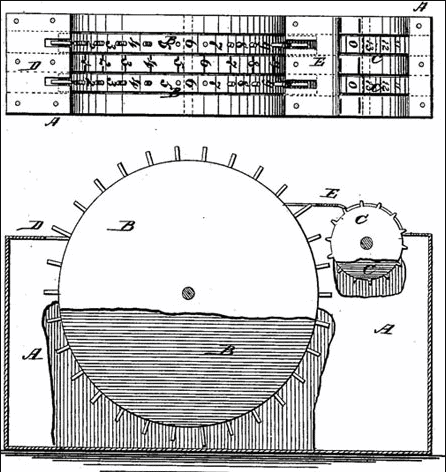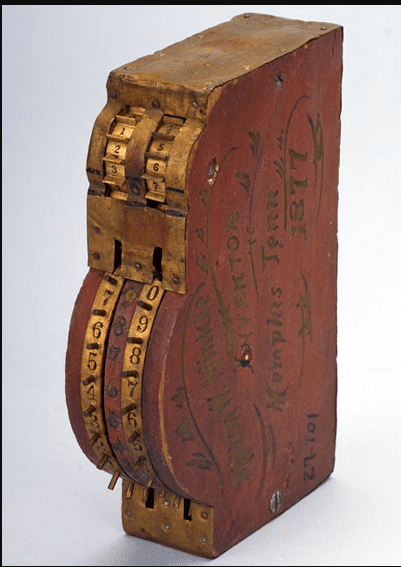In 1877, Milton Hinkle invented a simple adding device that resembles and functions similarly to adding devices invented by Jabez Burns in 1858 and John Ballou Newbrough in 1860. Today, it would be easy to say that they had seen each other’s work on the internet. But in the 1800s, inventors worked in relative isolation, unaware of each other’s work.
This type of near-simultaneous invention is now believed to result from social processes. And it happens more often than one may think. For example, on the same day that Alexander Graham Bell filed his patent for the telephone, another inventor named Elisha Gray, who was unfamiliar with this field of Bell’s work, filed a patent for a telephone. Gottfried Leibniz invented calculus independently of Isaac Newton, who is most often credited with inventing that field of mathematics. And Arthur Russel Wallace, who is hardly a household name, developed an almost identical theory of natural selection to Charles Darwin.
Who Was Milton Hinkle?
Milton Hinkle was an inventor born in 1848 in Carrollton, Carroll County, KY. Milton is remembered for his invention of a simple adding device, which was patented on March 5, 1878.
Milton’s simple adding device was somewhat similar to the earlier devices of Jabez Burns and John Ballou Newbrough, with its patent model surviving our time and still preserved in the collection of the National Museum of American History in Washington, D.C.
Milton’s death date isn’t available.
Early Life
The information about Milton Hinkle is very scarce, with close to nothing recorded about his early life, education, etc.
Nonetheless, history shows that Milton was born on January 8, 1848, in Carrollton, Carroll County, KY, to Milton Washington Hinkle and Nancy Kennedy Hinkle. His father, Washington, was born in 1810 in Louisville, KY, and was a steamboat owner on the Ohio River.
Career
As mentioned above, apart from his invention of the simple adding machine in 1877, almost nothing is known about the inventor, including his career journey. However, since his father was a steamboat owner, we can safely assume that he supported his father’s business, perhaps while he was a kid, before his invention.
What Did Milton Hinkle Invent?
Milton Hinkle’s Adding Machine
Milton Hinkle invented a simple adding machine in 1877 while living in Memphis, Tennessee. The adding machine was patented on March 5, 1878 (US patent 200911), almost a year after the invention.

The machine was somewhat similar to the earlier devices of Jabez Burns and John Ballou. The patent model of the device survived to our time and is kept now in the collection of the National Museum of American History in Washington, D.C.
The patent model has wooden sides and a brass strip covering the front, bottom, and back. The instrument’s top is curved at the front to the shape of two wheels that rotate inside it. A strip of wood between the wheels has the digits from 1 to 9 marked on it.
Each wheel has the digits from 0 to 9 marked on it three times. A pin protrudes from the wheel between each digit, and each tenth pin is slightly longer than the others. The spacing of the digits is the same as that on the case.

The large wheels are linked to two smaller toothed wheels at the back of the instrument. These smaller wheels are marked with the numbers from 0 to 13 and are meant to move forward every time the large wheel passes a longer “10” pin, recording numbers that should be carried. This simple adding device doesn’t have separate wheels for registering results.
The operator places his finger upon the pin of the wheel opposite the index number representing the figure to be added and turns the said wheel until his finger strikes the finger-plate, all the wheels being adjusted before beginning with their zeroes in the first place above the plates D E.
Milton Hinkle: Marriage, Divorce, Children, and Personal Life
Marriage
No history book or resource states whether Milton Hinkle was married.
Children
Neither the marriage life nor the children of Milton were recorded. Therefore, it’s difficult to state whether Milton Hinkle has any child or otherwise.